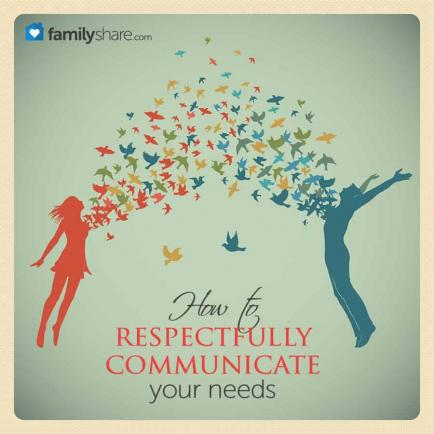
You take two people from different backgrounds and put them together for an extensive period of time and you are bound to have a difference of opinion. Not only that, but you will most likely have different ways to approach conflict and communicate your needs. This is marriage. You converse with each other daily, but do you realize that how and what you say can literally be the distinguishing factor between a great marriage and a tolerable one?
If you want to become more skillful at not only communicating your needs but also graciously receiving the needs of your spouse, let me offer a few suggestions.
When communicating a need to your spouse:
Be direct
Just because you express several times a day how strongly you feel about having a clean kitchen it does not mean your husband will suddenly start wiping down the counters. You can't find fault with him if you haven't taken the time to communicate your expectations.
The best way to avoid feelings of resentment from unmet expectations is by simply voicing exactly what you want. For the wife who wants more help around the house, an effective approach might be: "Hey babe, do you mind helping me with the dishes after dinner? It would mean a lot to me. If we get the kitchen cleaned up now, we will have more time to spend with each other later on." This invites (not nags) the spouse to help. It also communicates that he is what's important - not the task at hand.
Tone
According to Professor Albert Mehrabian, known for his publications on the importance of verbal and nonverbal messages, the tone of voice we use is responsible for about 35-40 percent of the message we are sending. When your spouse asked you to pick up the kids from soccer practice and you said, "Alright," did you sound sarcastic, indifferent, distracted or sincere? Especially when speaking to your sweetheart, you need to be mindful of the tone you use.
Timing
Pick your battles and your battleground. If you'd like to talk about money matters, choose a time when both of you are in a stress-free environment and able to talk without distractions - like after the kids are in bed. Timing can be the difference between engaging in a constructive conversation and erupting like Mount St. Helens.
When you are on the receiving end of hearing your spouse's concern:
Just listen
Listening entails much more than idly giving verbal cues while surfing the net. Here are a few things to keep in mind when your spouse is speaking his mind: keep eye contact, put away all distractions (like turning off phones and TVs), don't interrupt, and repeat back his objective to avoid misunderstandings. So often we think we know what the other person is going to or trying to say so we cut them off mid-sentence or tune out completely. Especially when it comes to the person with whom you share your life, you need to show her your love and attentiveness by listening and internalizing her thoughts and feelings - no matter the subject.
Read here for more about effective listening.
Validate
Validating is the last step to letting your spouse know you have truly heard her and want to understand her needs.
Mark D. Ogletree and Douglas E. Brinleystate this on validating your spouse's feelings: "Often we may forget one final point in communicating with each other. Part of the reason we take risks in sharing with one another is to have our need for validation met. It is not enough to let our spouse share with us; we must take it a step further and validate the risk he or she just took in sharing with us."
You might reply with something as simple as, "Thank you for sharing that with me. I love hearing about your day." If you've discussed weightier matters, you can say something like: "That must have been difficult to share with me, but I'm so glad you did. I may not understand all you are feeling now, but I want to. I hope together we can figure this out."
In a marriage, you need to be so careful about how and what you communicate to your spouse. Most of us are much more fragile and vulnerable than we let on. I'm reminded of the words of a prominent family advocate Thomas S. Monson, "Never let a problem to be solved become more important than a person to be loved."
Going forward, resolve to communicate more effectively by first voicing expectations with kindness and then receiving them with compassion and love. By doing so, you not only foster a deeper communion as husband and wife, but also as mother and father.

